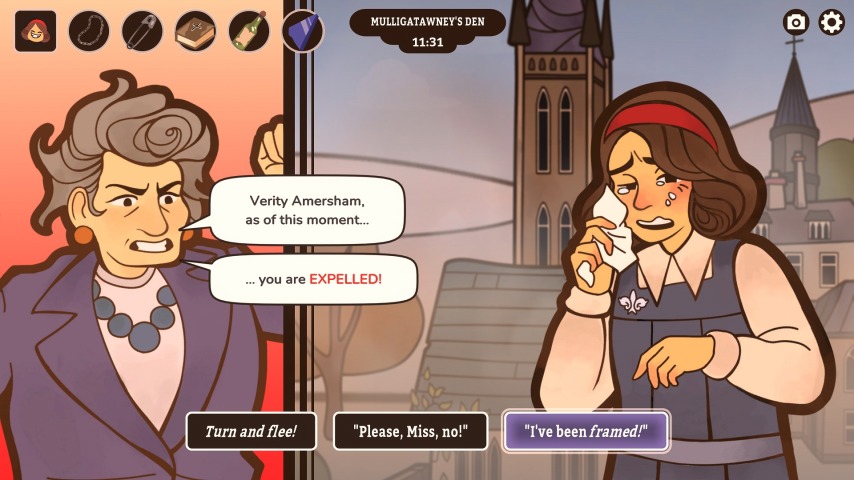One of the things I love about detective games is that they posit the existence of an Answer. You may not get it—Pentiment, one of the best investigation games of the last several years, draws much of its emotional heft from the moment where facts and time run out and you just have to pick someone to pin it all on. But the Answer is out there, a singular solution to be quested for, if not achieved.
In Expelled!‘s case, that ongoing sense of alibi-and-evidence FOMO is exacerbated by a ticking clock, as teenage Scholarship Girl Verity Amersham races all around her school trying to stay ahead of accusations that she shoved a classmate out of a priceless stained glass window. Since Verity has no alibi for the incident, there’s no point in trying to gather evidence exonerating yourself: Instead, you bounce around the school, hunting down information that can be used as a pressure point on the people around you to lure them into being on your side (either through persuasion or outright blackmail). But every tributary chosen means another three that get cut off, and the looming sense of wasted time and missed opportunities begins to grate as the day ticks down to an inevitable confrontation. You know there is a correct course of actions to take—otherwise, no video game—but because you’re forging a new “truth,” instead of discovering the real one, the burden of responsibility threatens to overwhelm.
This pressure is meant to be alleviated by Expelled!‘s structure, which, like Overboard!‘s, expects you to play through the day’s events again and again in order to gain new information, refine strategies of manipulation, and make for a perfectly efficient “getting away with it” spree. But despite the game giving you a handy set of questions to answer to help remove obstacles from your path (one of a couple of welcome quality-of-life mechanics that make the repetition a bit less onerous), it also means that some of those familiar Groundhog Day feelings of futility seep into the player, rather than the character. Spending 20 minutes on a playthrough where you scruffled up a few scant truffles of new information isn’t always satisfying enough to make pushing the “restart the day” button compelling; the fact that success sometimes feels like the result of pushing in random directions—I basically stumbled into the first time I made it to the end of the day without getting kicked out of school because I’d been deliberately pursuing actions that didn’t make a ton of narrative sense—left me feeling like I was going to have to poke at every single one of the game’s huge mass of choices and dialogue options in order to find a proper path.
Great writing could help here, but Expelled! tends to top out at serviceable, with a setting, and characters, largely drawn from stock tropes. (There’s none of the inventiveness of world or emotion that helped make writer Jon Ingold’s earlier Heaven’s Vault so compelling.) Verity, especially, is a disappointment: Part of the fun of a game like this should be getting to revel in a bit of wickedness, but even the options the game explicitly flags as “bad”—with a system that tracks the character’s steady devolution from “perfect” to “silly” to “cheeky” to actively malevolent—rarely feel enjoyably indulgent. (The knowledge that pursuing something genuinely and amusingly anti-social might force me into an early reset stayed my hand more than once; what’s the point of playing as a budding villain when you have to be afraid of consequences?)
But when I think back over the general apathy Expelled! (and Overboard! before it—if you enjoyed the previous game, feel free to ignore me here, because I had the same critiques there) provokes in me, that structure is the ultimate culprit. Games about getting away with shenanigans have a long history of employing time loop mechanics, because they naturally gel with the “Try something, learn from it, try something else” nature of finding the proper path to freedom. Deathloop, indie games like The Deed, the much-maligned Twelve Minutes: All of them use repetition to allow players to trial-and-error their way to a perfect sequence of success. Expelled! isn’t quite as relentless in dictating one specific course of action, but it still gives me the sense of wrestling with a large and bulky machine with a thousand different levers sticking out of it, some of which must be successfully manipulated in sequence in order to succeed—and with doing it all all over again as the punishment for failure. In my specific case, that meant that, after I avoided expulsion for the first time—a moment that should be one of the game’s biggest triumphs, as it cleverly peels back a few more layers of the onion to let players in on Verity’s true goals—I was instead overwhelmed with exhaustion. Rather than getting excited for the deeper mysteries the game suddenly hinted at, I just stared at that “restart” button with a feeling of weariness. I ultimately just shut the game off, telling myself a middling conclusion was good enough.
There are moments of cleverness and intrigue to be found in Expelled!. The points where you find a new lever to grab in one of your schoolmates’ heads can be exhilarating; getting a sense of the web of secrets underpinning the game’s events scratches the same itch as ferreting out the truth in any good detective game. And the game itself is lovely, with a slight storybook quality to the art that makes Miss Mulligatawney’s School for Promising Girls a pleasant enough place to spend a few hours. But, it turns out, being a criminal is a lot more exhausting than being the investigator trying to catch them. Getting away with murder—or defenestration, at the very least—turns out to be a lot more work than I was hoping it would be.

 Keep scrolling for more great stories.
Keep scrolling for more great stories.
